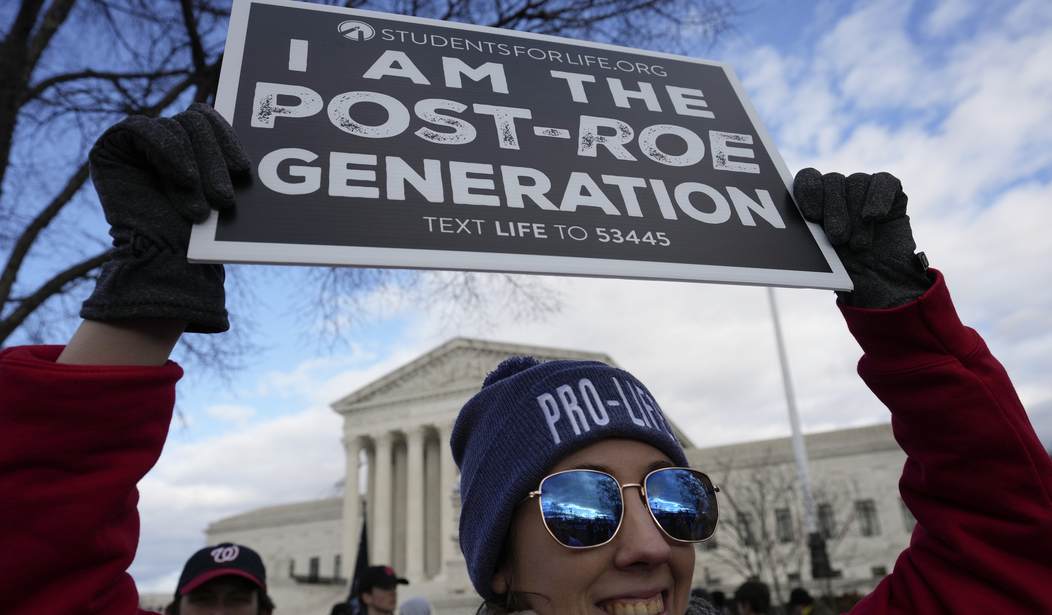The abortion debate has returned to the national stage after a judge issued a ruling stopping the Food and Drug Administration (FDA) from approving mifepristone, otherwise known as the “abortion pill.” After the Supreme Court ruling overturning Roe v. Wade, states have been implementing legislation to limit, or eliminate, access to the procedure.
Pro-abortion Democrats have decried these moves on the part of Republican officials, claiming they are attempting to control women’s bodies and turn the TV show “The Handmaid’s Tale” into a reality.
After the judge issued the ruling related to the abortion pill, Democrats claimed, once again, that the GOP is attempting to ban abortion nationwide. This comes after Democratic members of Congress tried to enshrine Roe into law after the Supreme Court struck it down.
In a piece for The Atlantic, columnist Mary Ziegler repeated this claim – but in a different way. Instead of accusing Republicans of trying to pass legislation at the national level to ban abortion directly, she says they are attempting to do so through other means.
“As the next chapter of the abortion wars has begun, attention has centered on abortion pills,” Ziegler wrote. “Simply because they’re used in a majority of abortion procedures, they have become a new fixation for the anti-abortion movement—which has championed drug-trafficking laws, pill-specific bans, and lawsuits in an attempt to block the use of this medication.”
The author concludes that the judge’s “unprecedented ruling” is more than “just a bid to block access to abortion pills” and is instead “an open invitation to anti-abortion groups to use the Comstock Act—a law passed 150 years ago and rarely enforced in the past century—to seek a nationwide federal ban on all abortions.”
For those who haven’t heard of this obscure piece of legislation, the Comstock Act was a federal law passed by the United States Congress on March 3, 1873, named after its chief promoter, Anthony Comstock. The law aimed to regulate obscenity and morality in the country by prohibiting the mailing or transportation of materials deemed obscene or lewd, including books, pamphlets, pictures, and other forms of media.
The law was mainly targeted toward materials related to contraception, abortion, and sexual education, which were deemed immoral and against the religious and moral values of the time. The Comstock Act had a significant impact on the publishing industry and the development of sexual education and reproductive health in the United States.
It remained in effect until the mid-20th century, and during that time, it was used to prosecute and imprison thousands of individuals and organizations for distributing and possessing materials deemed obscene or lewd.
In her article, Ziegler notes that the FDA has adopted an interpretation of the legislation that enables one to mail abortion pills “when the seller does not intend them to be used unlawfully.” But she also points out that there is no way to perform an abortion using equipment designed for that purpose that has not been sent through the mail. “Taken to its logical conclusion, [the judge’s] ruling means that all abortions already violate criminal law.”
It is possible that this might be a way for pro-life officials to curtail, or eliminate, abortion on a national scale. This is already a debate going on between the pro-life and pro-abortion camps. But what about the conversation among those who do not approve of abortion?
Some argue that the government should not allow abortion in any state while others believe the states should decide how to handle the matter. I think this debate is going to become even more prevalent as America adjusts to a post-Dobbs world.
The argument will center on whether the federal government has a role to play in deciding how states can address the abortion issue. From where I sit, abortion is a matter of natural rights, which means this is one of the very rare instances in which I think it is permissible for the federal government to intervene.
The role of any governing authority is to protect our natural rights, which include the right to life. If a state violates natural rights, the federal government can use its powers to enforce the Bill of Rights, which protects individual rights against government infringement. If a state were to pass a law that violated the First Amendment’s guarantee of freedom of speech, the federal government could challenge the law and have it struck down as unconstitutional.
For example, when the federal government intervened to end slavery and later to address systemic discrimination under Jim Crow, it was doing so to protect the natural rights of black Americans. Since I believe life begins at conception, I believe there is a life growing inside the mother. It is not a fully developed human, but it is human. It has DNA, cells, etc. This means it is a being that is endowed with natural rights that should not be infringed upon.
This is why I don’t have a problem with the idea that the federal government should work to safeguard the lives of the unborn. Contrary to what the pro-abortion crowd says, this is not just about the woman’s body – it is about the life that is growing inside of her. If this isn’t a situation in which natural rights should be protected, I don’t know what is.
The opinions expressed by contributors are their own and do not necessarily represent the views of RedState.com.














